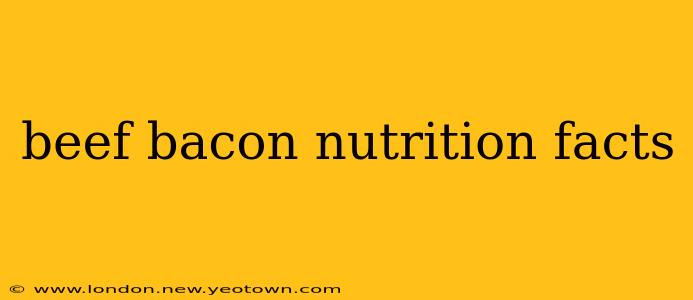Bacon. That crispy, salty delight that elevates everything from breakfast sandwiches to salads. But what about beef bacon? This delicious alternative offers a unique flavor profile and a slightly different nutritional breakdown compared to its pork counterpart. Let's explore the nutritional facts of beef bacon and answer some common questions.
This journey into the world of beef bacon began with a simple question: "What's the difference between beef bacon and pork bacon?" The answer, it turns out, is multifaceted, going far beyond just the source of the meat. Let's delve into the details.
What are the nutritional values of beef bacon?
The nutritional content of beef bacon can vary depending on the cut of beef used, the processing method, and the brand. However, a general guideline for a 1-ounce (approximately 28-gram) serving of cooked beef bacon might look something like this:
- Calories: Around 90-110 calories
- Fat: 8-10 grams, often higher in saturated fat compared to pork bacon.
- Protein: 7-9 grams - a good source of protein compared to pork.
- Sodium: High; often exceeding 200mg per serving, sometimes significantly higher. This is a major factor to watch in a beef bacon diet.
- Carbohydrates: Typically negligible.
- Fiber: Minimal.
Important Note: These are estimates, and it's crucial to always check the specific nutritional information printed on the packaging of the beef bacon you purchase. Nutritional content can vary significantly across brands and products.
Is beef bacon healthier than pork bacon?
This is a common question, and the answer isn't a simple "yes" or "no." While beef bacon can offer slightly more protein, it often contains a higher percentage of saturated fat than pork bacon. Both types of bacon are high in sodium, which is a concern for those watching their sodium intake.
Ultimately, whether beef bacon is "healthier" depends on your individual dietary needs and preferences. If you're focusing on protein intake, beef bacon might be a slightly better choice. However, if you're watching your saturated fat intake, pork bacon may be a preferable option. The key is moderation and awareness of your overall dietary choices.
How much fat is in beef bacon?
The fat content in beef bacon, as mentioned above, is typically higher than in pork bacon, often ranging from 8 to 10 grams per ounce. A significant portion of this fat is saturated fat, which can contribute to high cholesterol levels if consumed excessively. Therefore, conscious consumption and moderation are key.
How many calories are in beef bacon?
A typical serving (1 ounce) of beef bacon contains approximately 90-110 calories. However, this can fluctuate based on the brand, preparation method, and thickness of the bacon. Always check the nutrition label on your specific product for the most accurate information.
Is beef bacon high in sodium?
Yes, beef bacon is generally high in sodium. Just like pork bacon, the salt used in curing and processing contributes significantly to its high sodium content. Individuals with high blood pressure or those on a low-sodium diet should exercise caution and consume it sparingly.
What are the health benefits of beef bacon?
Beef bacon, while high in fat and sodium, does offer some nutritional benefits. It's a good source of protein, which is essential for building and repairing tissues. However, the potential health benefits are easily outweighed by the negative effects of its high fat and sodium content if consumed regularly in large quantities. Think of beef bacon as an occasional treat rather than a staple in your diet.
This detailed analysis provides a comprehensive overview of beef bacon's nutritional profile. Remember, moderation is key, and understanding the nutritional content allows you to make informed choices for your diet. Always read the labels on the products you buy for the most accurate nutritional information.

